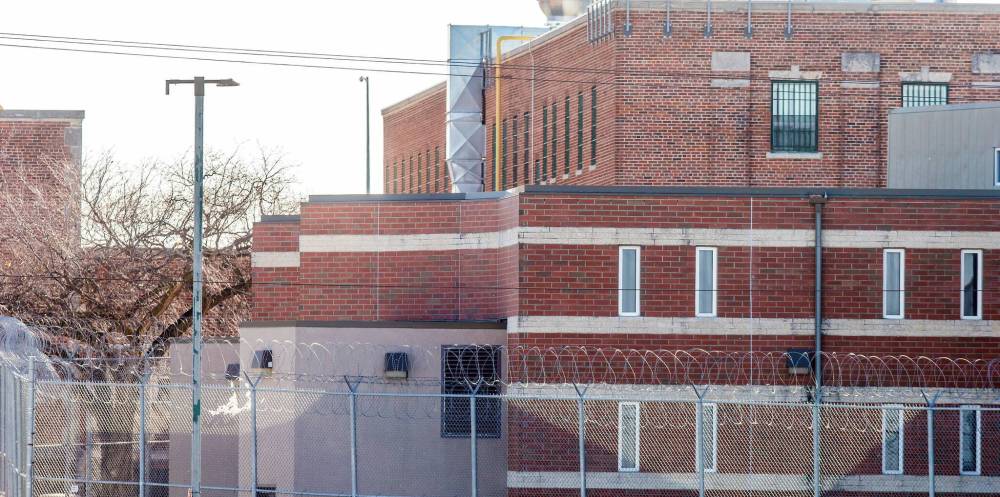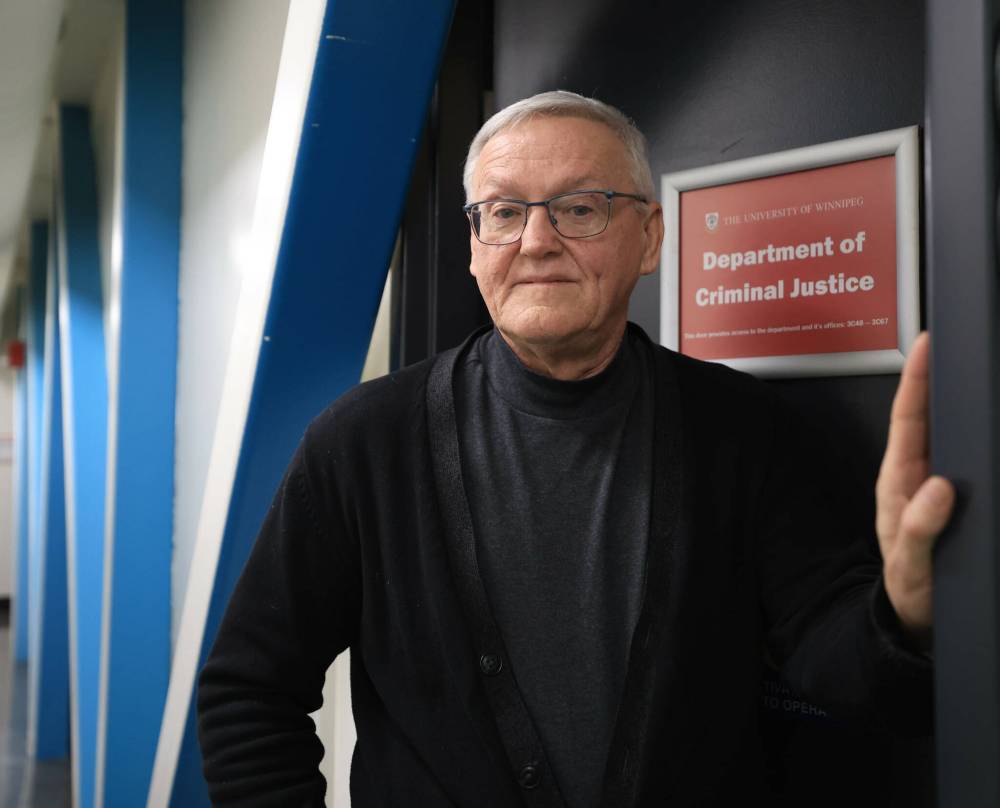Province plans to begin tracking solitary confinement use in jails more than a year after judge called for review of practice
Read this article for free:
or
Already have an account? Log in here »
To continue reading, please subscribe:
Monthly Digital Subscription
$1 per week for 24 weeks*
- Enjoy unlimited reading on winnipegfreepress.com
- Read the E-Edition, our digital replica newspaper
- Access News Break, our award-winning app
- Play interactive puzzles
*Billed as $4.00 plus GST every four weeks. After 24 weeks, price increases to the regular rate of $19.00 plus GST every four weeks. Offer available to new and qualified returning subscribers only. Cancel any time.
Monthly Digital Subscription
$4.75/week*
- Enjoy unlimited reading on winnipegfreepress.com
- Read the E-Edition, our digital replica newspaper
- Access News Break, our award-winning app
- Play interactive puzzles
*Billed as $19 plus GST every four weeks. Cancel any time.
To continue reading, please subscribe:
Add Free Press access to your Brandon Sun subscription for only an additional
$1 for the first 4 weeks*
*Your next subscription payment will increase by $1.00 and you will be charged $16.99 plus GST for four weeks. After four weeks, your payment will increase to $23.99 plus GST every four weeks.
Read unlimited articles for free today:
or
Already have an account? Log in here »
Hey there, time traveller!
This article was published 03/01/2025 (283 days ago), so information in it may no longer be current.
Manitoba doesn’t track how much time provincial inmates spend in solitary confinement, nearly 1½ years after a judge called on the government to launch an independent review of its use of the widely condemned practice.
In a Dec. 12 letter, Manitoba’s ombudsman said it could not provide data on the time inmates are segregated because the province does not collect it, following a freedom of information request by the Free Press.
On Thursday, a spokesperson for Justice Minister Matt Wiebe said that will change, with the province planning to roll out a tracking system “in the coming weeks.”
“In Manitoba correctional facilities, segregation is used as a last resort and only if an inmate is posing a threat to themselves or others,” the spokesperson said in a statement. “Unlike the previous government, we are taking action by developing a program that will allow correctional centres to track the number of hours or days an inmate spends in segregation.”
An interview with Wiebe was not granted.
Provincial law states inmates can be placed in disciplinary segregation for up to 15 consecutive days. However, there’s no time limit for inmates placed in preventative segregation.
The United Nations has deemed prolonged solitary confinement — 15 days or more — a form of torture.
MIKAELA MACKENZIE / FREE PRESS FILES Headingley Correctional Centre frequently used periods of segregation for most disciplinary infractions in 2022.
In May 2023, provincial court Judge Stacy Cawley issued recommendations about Manitoba’s use of solitary confinement after the death of inmate Jeffrey Owen Tait triggered an inquest.
Tait, 31, died by suicide in Headingley Correctional Centre in 2019. He was found on the floor of a segregation unit with fabric wrapped around his neck.
In the report, Cawley made seven recommendations, including that the province appoint an independent third party to review how Manitoba Correctional Services uses solitary confinement.
The recommendations also tasked the review to seek whether it was being used as a last resort and to reduce the number of hours inmates spend in segregation.
Zilla Jones, a Winnipeg criminal defence lawyer who represented Tait’s family during the inquest, said it’s impossible to make systemic change if there isn’t information to act upon.
“You can’t really see (the issues) if you don’t have a mechanism to report them,” Jones said, adding she has seen her clients mentally and physically deteriorate when placed in segregation, often making existing conditions worse.
When the province doesn’t track the hours, it makes it difficult for lawyers to argue against mistreatment, she said.
JOHN WOODS / FREE PRESS FILES Zilla Jones said when the province doesn’t track the hours, it makes it difficult for lawyers to argue against mistreatment.
“Often a client will tell their lawyer, ‘I’ve been inside for a month,’ or something like that, but then the jail will not confirm that,” said Jones. “It’s hard to even know what’s happening, so that you can address it.”
She said there isn’t proper oversight when segregation is used because the province doesn’t have to disclose anything unless forced by inquests or lawsuits.
An independent investigation is necessary to have an unbiased analysis of the practice, said Jones.
“So, if you have an outside body that is looking at what you’re doing, then they can spot trends or problems that are concerning, and they can then ask for change,” she said.
The province wouldn’t say if a third-party investigation is underway, but said Manitoba corrections officials have been conducting an internal review of segregation. No other details were provided.
Michael Weinrath, a University of Winnipeg criminology professor, was surprised to learn the province doesn’t record the data of time spent in solitary confinement.
“We really know very little about what goes on in provincial jails,” he said. “Provinces often fly under the radar for these issues because they don’t release a lot of information.”
RUTH BONNEVILLE / FREE PRESS Michael Weinrath, a University of Winnipeg criminology professor, was surprised to learn the province doesn’t record the data of time spent in solitary confinement.
He said Ottawa is more transparent about segregation inside federal prisons.
In 2019, the federal government banned the use of segregation as a punishment following multiple lawsuits filed over the practice. Now, isolated federal inmates must be granted four hours a day outside their cells, including two hours of “meaningful human contact,” although some say the rules aren’t always being followed.
The province didn’t say whether it will follow suit with a similar amendment, but a spokesperson for Wiebe said justice officials are reviewing the use of disciplinary segregation.
Solitary confinement has remained widespread in Manitoba jails.
A 2023 Free Press investigation found that Headingley Correctional Centre — the province’s largest jail — frequently used periods of segregation for most disciplinary infractions in 2022.
Tait’s father, Eugene Marvin Tait, filed a lawsuit against the province in 2023, alleging staff failed to ensure his son’s safety and well-being.
The Manitoba government has denied wrongdoing.
Its statement of defence also argues the lawsuit should be dismissed because it was not filed within two years of Tait’s death as required under provincial law.
In November, the province filed a notice of motion seeking a summary judgment, which would allow for a Court of King’s Bench justice to decide on the claim without a full trial.
Progressive Conservative justice critic Wayne Balcaen said the NDP’s failure to act on the inquest recommendations mirrors the government’s broken election promises to implement bail reform in Manitoba.
“Just another example of their pattern of inaction on crime and safety in Manitoba,” he told the Free Press in an email Friday.
— With files from Erik Pindera
fpcity@freepress.mb.ca
History
Updated on Friday, January 3, 2025 10:38 PM CST: Updates name of jail





